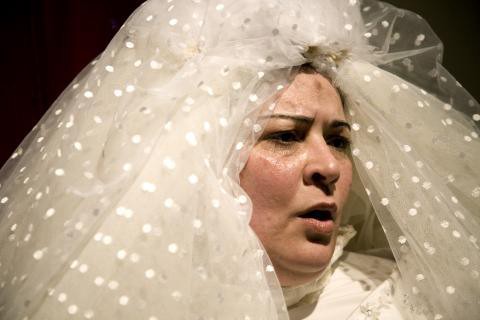Zeina Daccache is a Lebanese actress, director, and drama therapist. She has directed the award-winning film and stage versions of 12 Angry Lebanese (2009, First Prize — Muhr Arab Documentary at DIFF), which was presented by male inmates at the Roumieh Prison, and Any, which documented the lives of Lebanese women following the July 2006 war. Daccache has also founded the Catharsis-Lebanese Center For Drama Therapy. (Dubai IFF)
Scheherazade’s Diary will screen twice at the Human Rights Watch Film Festival on June 22.
W&H: Please give us your description of the film.
DZ: Imprisoned women, whether mothers or daughters, take center stage in Scheherazade’s Diary, a documentary filmed throughout Catharsis, the non-profit drama therapy/theatre project that I set up in 2012 in Lebanon’s Baabda Prison. The female inmates mine the depths of personal experience and confront patriarchy as they prepare and present the first theatre play staged inside an Arab women’s prison.
W&H: What drew you to this story?
DZ: This is my second documentary shot inside a prison. The first one (12 Angry Lebanese) was shot in Roumieh, a male prison. I am a drama therapist/theatre director, so as with my first film, I brought a camera to shoot the whole process for Scheherazade’s Diary. I then watched the footage and saw something deeper and further than the play, and realized a film needed to be made.
W&H: What was the biggest challenge in making the film?
DZ: My films are really made at the editing stage. Creating a one-hour film from 90 hours of footage is not easy. Furthermore, my films are done with the minimum shooting material required (we only use daylight, the sound boom is held by the inmates, etc.)
W&H: What advice do you have for other female directors?
DZ: Be real: if you feel you are “inventing a scene” (i.e., crafting things, not leaving them spontaneous), then you are creating a story and not the population’s story. Keep the story as is, the style as is, and, most of all, keep the message as is.
W&H: What’s the biggest misconception about you and your work?
DZ: That I always intend to make a film, whereas I only decide if there’s a film at the point where around 100 of hours of footage have been shot.
W&H: Do you have any thoughts on what are the biggest challenges and/or opportunities for the future with the changing distribution mechanisms for films?
DZ: Yes, less money to the filmmakers or producers and therefore less money to the cause (in my case: the cause of the prisoners). That’s why picking a good distributor is the biggest challenge.
W&H: Name your favorite woman directed film and why.
DZ: Nadine Labaki. She’s a Lebanese filmmaker who’s genuine, and genuine people are rare nowadays.







